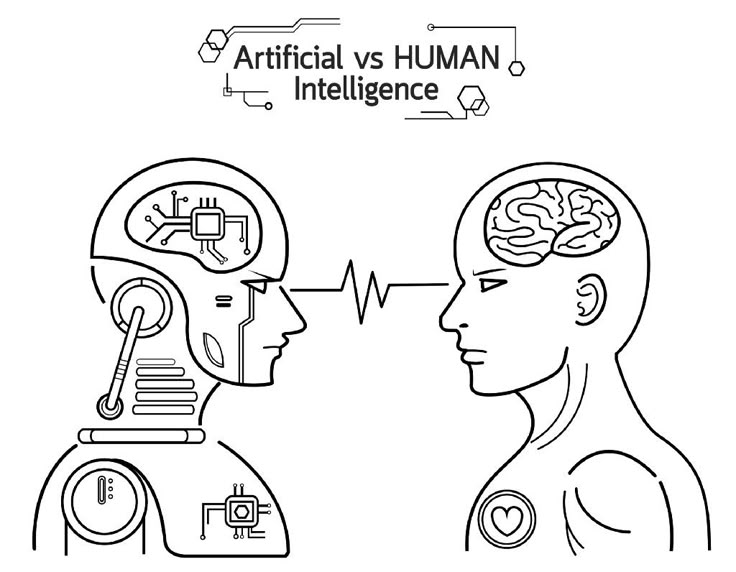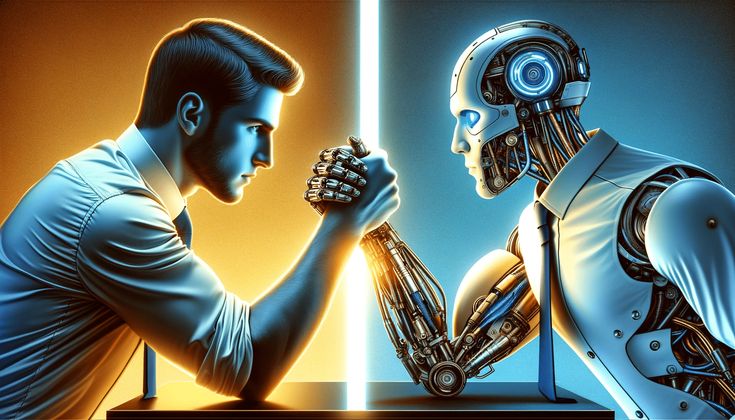Brains vs. Bytes: Is AI Smarter Than Humans?

The Smarter Intelligence
The question of whether artificial intelligence (AI) has surpassed human intelligence has become one of the most debated topics in both technology circles and mainstream society, With AI defeating human champions in complex strategy games like Go and chess, generating creative content, and even diagnosing diseases with impressive accuracy, it is tempting to assume that machines may now be “smarter” than humans, However, intelligence is a multi-faceted concept that extends far beyond speed, memory, or pattern recognition.
True intelligence involves creativity, emotional understanding, ethical reasoning, adaptability, and contextual awareness, areas where humans still maintain a substantial advantage. To navigate this debate meaningfully, it is essential to explore the specific strengths and limitations of AI and compare them with the enduring qualities of human cognition.
The Strengths of Artificial Intelligence
AI has demonstrated extraordinary capabilities in areas where sheer processing power and consistency matter, One of its most remarkable strengths is its ability to analyze and process vast amounts of data at speeds that no human could achieve. In industries such as finance, AI algorithms can scan millions of transactions in seconds, detecting anomalies and flagging potential fraud faster than any human team. In healthcare
AI systems can examine thousands of medical images and cross-reference them with extensive databases of prior cases, often identifying subtle patterns that may elude even experienced radiologists. This ability to recognize patterns and extract actionable insights from massive datasets is one of AI’s most transformative attributes.

Beyond raw speed and analytical capacity, AI brings unprecedented precision and consistency to tasks. Unlike humans, AI does not suffer from fatigue, distraction, or lapses in attention. A machine learning model, once properly trained, will execute a repetitive task, whether it’s sorting, classifying, or predicting outcomes, with unwavering accuracy. This reliability has proven invaluable in fields like manufacturing, logistics, and quality control, where human error can have costly consequences.
Another area where AI excels is the automation of repetitive or mundane tasks. Routine processes that historically required human labor, data entry, transaction processing, or even basic customer service can now be managed efficiently by AI systems. By taking over these responsibilities, AI frees human workers to focus on more complex, strategic, or creative activities.
This shift not only improves operational efficiency but also encourages innovation, as humans are freed from the constraints of monotonous labor. Companies that integrate AI into their workflows often experience significant gains in productivity and cost reduction, illustrating the transformative potential of these technologies.
The Limitations of AI
Despite its strengths, AI is far from a perfect imitation of human intelligence.
One of the most glaring limitations is its lack of emotional intelligence. AI can be programmed to recognize certain emotional cues, such as tone of voice, facial expressions, or word choice, but it does not truly “understand” emotions. It cannot experience empathy, compassion, or intuition in the way humans do.
As a result, roles that require genuine human connection, such as counseling, negotiation, or leadership, remain largely outside AI’s domain. Even with advanced natural language processing, AI responses are ultimately the product of pattern recognition rather than authentic understanding.
Creativity is another area where AI struggles. While AI can generate music, art, or written content by analyzing existing works and extrapolating patterns, it lacks the intrinsic inspiration that drives human innovation.
Human creativity often arises from combining seemingly unrelated ideas, exploring abstract concepts, or responding to emotional experiences, capabilities that AI cannot replicate in a genuinely original way. This distinction becomes particularly important in fields such as art, design, scientific discovery, and entrepreneurship, where innovative thinking is essential.
Additionally, AI is heavily dependent on the quality and quantity of the data it receives. Inaccurate, incomplete, or biased datasets can lead to flawed or even harmful outcomes.
For example, AI systems trained on biased data can perpetuate stereotypes or make unfair decisions in hiring, lending, or criminal justice applications. This reliance on data underscores the importance of human oversight and ethical governance in AI deployment. Without careful management, even the most advanced AI can produce results that are misleading or socially problematic.
Human Intelligence
While AI continues to evolve, human intelligence encompasses qualities that machines cannot fully replicate. Emotional and social intelligence, for instance, allows humans to navigate complex social landscapes, interpret subtle cues, and build deep, meaningful relationships. The ability to empathize, communicate effectively, and adapt behavior to the nuances of social contexts is critical in leadership, collaboration, and caregiving, areas where AI remains limited.
Ethical and moral reasoning is another domain where humans excel. Humans can weigh the consequences of actions, consider fairness, justice, and societal norms, and make decisions that align with values beyond mere efficiency. While AI can be programmed to follow ethical guidelines, it lacks an innate sense of morality or the ability to navigate morally ambiguous situations with genuine understanding.

Humans also demonstrate remarkable adaptability and the ability to learn from experience. Unlike AI, which requires retraining or reprogramming when faced with unfamiliar situations, humans can adjust their strategies dynamically, learning from mistakes and applying knowledge to new and unforeseen challenges. This adaptability is central to human innovation, problem-solving, and survival in complex, unpredictable environments.
The Synergy Between AI and Human Intelligence
Rather than viewing AI and human intelligence as competitors, it is more productive to see them as complementary forces. AI can handle tasks that demand speed, precision, and data-driven decision-making, while humans contribute creativity, ethical judgment, and emotional insight. When combined, the two can achieve outcomes that neither could accomplish alone.
In healthcare, for instance, AI can quickly analyze medical imaging and identify potential issues, but doctors provide nuanced interpretation, consider patient history, and make ethical decisions about treatment options. Similarly, in business, AI can forecast market trends with incredible accuracy, but human leaders determine strategic priorities and innovate in ways that data alone cannot dictate. This synergy highlights the potential for collaboration between humans and machines rather than a contest of intelligence.
The Future of Intelligence
While AI has made extraordinary progress, it has not surpassed humans in all dimensions of intelligence. Its strengths lie in processing, automation, and data-driven insights, but humans continue to lead in creativity, emotional intelligence, and moral reasoning.
The future of intelligence is not likely to be a competition but a collaboration, leveraging the unique capabilities of both AI and humans to tackle challenges, drive innovation, and improve productivity. By embracing this partnership, society can unlock unprecedented possibilities, ensuring that technology enhances human life rather than replacing the qualities that make us distinctively human.
(All images are from pinterest)
Recommended Articles
Melody Maker AI: Google's Gemini App Now Composes Music!

Google has launched an AI music generation feature within its Gemini app, powered by DeepMind's Lyria 3 model, allowing ...
Pentagon Shocks World: Adopts Musk's Controversial Grok AI Amidst Global Outcry!
The Pentagon has announced plans to integrate Elon Musk’s Grok AI into military systems, sparking global controversy o...
Legal Showdown Looms: Elon Musk's OpenAI Fraud Lawsuit Heads to Trial
A federal judge has cleared the path for a jury trial in Elon Musk's lawsuit against OpenAI, alleging the AI trailblazer...
Robots Invade Silicon Valley! Humanoids Spark Awe and Skepticism at Tech Summit
The commercial boom in artificial intelligence is revitalizing Silicon Valley's interest in humanoid robots, leading to ...
SoftBank's $4 Billion AI Infrastructure Push: DigitalBridge Acquisition Shakes Up Tech Landscape

SoftBank Group is set to acquire digital infrastructure investor DigitalBridge Group for $4 billion, significantly expan...
US Government Greenlights Advanced Nvidia AI Chip Exports to China
President Donald Trump has authorized Nvidia to sell advanced H200 AI chips to approved customers in China, a move inten...
You may also like...
Bundesliga's New Nigerian Star Shines: Ogundu's Explosive Augsburg Debut!

Nigerian players experienced a weekend of mixed results in the German Bundesliga's 23rd match day. Uchenna Ogundu enjoye...
Capello Unleashes Juventus' Secret Weapon Against Osimhen in UCL Showdown!

Juventus faces an uphill battle against Galatasaray in the UEFA Champions League Round of 16 second leg, needing to over...
Berlinale Shocker: 'Yellow Letters' Takes Golden Bear, 'AnyMart' Director Debuts!

The Berlin Film Festival honored
Shocking Trend: Sudan's 'Lion Cubs' – Child Soldiers Going Viral on TikTok

A joint investigation reveals that child soldiers, dubbed 'lion cubs,' have become viral sensations on TikTok and other ...
Gregory Maqoma's 'Genesis': A Powerful Artistic Call for Healing in South Africa

Gregory Maqoma's new dance-opera, "Genesis: The Beginning and End of Time," has premiered in Cape Town, offering a capti...
Massive Rivian 2026.03 Update Boosts R1 Performance and Utility!

Rivian's latest software update, 2026.03, brings substantial enhancements to its R1S SUV and R1T pickup, broadening perf...
Bitcoin's Dire 29% Drop: VanEck Signals Seller Exhaustion Amid Market Carnage!

Bitcoin has suffered a sharp 29% price drop, but a VanEck report suggests seller exhaustion and a potential market botto...
Crypto Titans Shake-Up: Ripple & Deutsche Bank Partner, XRP Dips, CZ's UAE Bitcoin Mining Role Revealed!

Deutsche Bank is set to adopt Ripple's technology for faster, cheaper cross-border payments, marking a significant insti...
